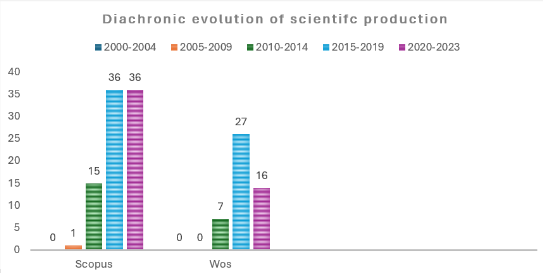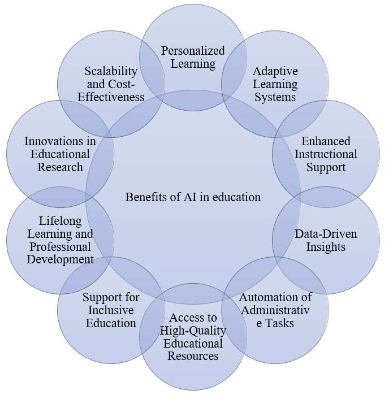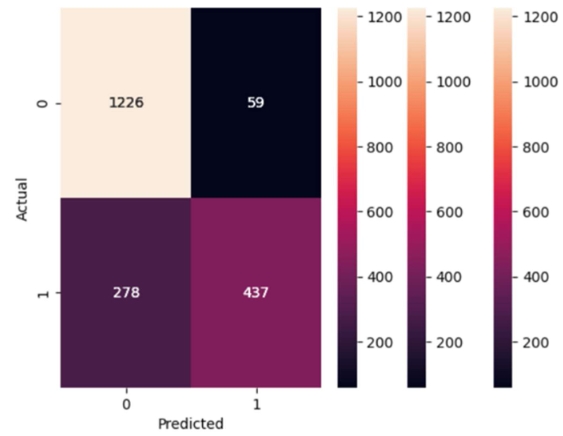The effectiveness of in-service teacher training programs in enhancing teaching quality and student achievement
Abstract
In the rapidly evolving landscape of education, the continuous professional development of teachers is essential for maintaining high standards of teaching and enhancing student achievement. In-service teacher training programs, which provide ongoing education and training for currently employed teachers, are a crucial component of this professional development. This study uses a mixed-methods approach to investigate the efficacy of in-service teacher training programs in enhancing student success and teaching quality. To obtain thorough data on their experiences and perspectives, 286 in-service teachers from various schools around Kampala completed a survey. Additionally, 52 in-service teachers were interviewed, providing a comprehensive insight into their experiences. According to the quantitative results, 71% of the respondents had previously taken part in in-service training; 61% reported improvements in the quality of their instruction, and 71% noted improvements in student performance. The chi-square tests and regression analysis results showed that in-service training significantly improved student achievement and teacher quality. These findings were corroborated by the qualitative data, which highlighted themes including improved teaching strategies, increased teacher confidence, enhanced student engagement, impact on student achievement, and teacher motivation and morale. The study also highlights the value of peer cooperation and hands-on workshops in training programs and emphasizes the necessity of ongoing, customized professional development. This study offers a comprehensive knowledge of the efficacy of in-service teacher training programs by integrating quantitative and qualitative data. This understanding will be beneficial for educators and policymakers as they build more effective professional development initiatives.
References
[1]Arifin A, Suryaningsih S, Arifudin O. The Relationship Between Classroom Environment, Teacher Professional Development, and Student Academic Performance in Secondary Education. International Education Trend Issues. 2024; 2(2): 151–159. doi: 10.56442/ieti.v2i2.467
[2]Smith C, Gillespie M. Research on Professional Development and Teacher Change: Implications for Adult Basic Education. Review of Adult Learning and Literacy. 2023; 7: 205–244. doi: 10.4324/9781003417996-7
[3]Uzorka A, Namara S, Olaniyan AO. Modern technology adoption and professional development of lecturers. Education and Information Technologies. 2023; 28(11): 14693–14719. doi: 10.1007/s10639-023-11790-w
[4]Damianidou E. Obligatory professional training for in-service teachers: Worthy time or a waste of time? European Journal of Teacher Education. 2021; 47(1): 23–40. doi: 10.1080/02619768.2021.1961734
[5]Surahman E, Wang TH. In-service STEM teachers professional development programmes: A systematic literature review 2018–2022. Teaching and Teacher Education. 2023; 135: 104326. doi: 10.1016/j.tate.2023.104326
[6]Uzorka A, Makumbi D, Kalabuki K. The impact of the COVID-19 pandemic on the soft skills of lecturers. Forum for Education Studies. 2024; 2(2): 569. doi: 10.59400/fes.v2i2.569
[7]Maharani F, Fithriani R. Exploring Challenges EFL Pre-Service Teachers Experience in Teaching Practicum: A Transformative Learning Perspective. Scope : Journal of English Language Teaching. 2023; 7(2): 173. doi: 10.30998/scope.v7i2.16305
[8]Qaisra R, Haider SZ. The Influence of In-Service Teachers Training Programs on the Professional Development of School Teachers. Pakistan Journal of Humanities and Social Sciences. 2023; 11(1): 507–516. doi: 10.52131/pjhss.2023.1101.0368
[9]Nkundabakura P, Nsengimana T, Uwamariya E, et al. Contribution of Continuous Professional Development (CPD) Training Programme on Rwandan Secondary School Mathematics and Science Teachers’ Pedagogical, Technological, and Content knowledge. Education and Information Technologies. 2023; 29(4): 4969–4999. doi: 10.1007/s10639-023-11992-2
[10]Asad Z, Javed DrF. Exploring the Effectiveness of In-service Training Programs for Enhancing Teaching Skills of ESL Teachers at Higher Education Level: Teachers’ Perceptions and Experiences. Journal of Arts & Social Sciences. 2023; 10(1): 198–207. doi: 10.46662/jass.v10i1.367
[11]Sampan IKC. Enhancing Educational Practices Through In-Service Training: Elementary School Teacher in Focus. International Journal of Research in Interdisciplinary Studies. 2024; 2(7): 4–10.doi: 10.5281/zenodo.12670001
[12]Ekantiningsih PD, Sukirman D. Trends of education and training teacher competency in information and communication technology. JurnalInovasiTeknologi Pendidikan. 2023; 10(1): 87–105. doi: 10.21831/jitp.v10i1.52630
[13]Polly D, Martin F, Byker E. Examining Pre-Service and In-Service Teachers’ Perceptions of Their Readiness to Use Digital Technologies for Teaching and Learning. Computers in the Schools. 2022; 40(1): 22–55. doi: 10.1080/07380569.2022.2121107
[14]Iqbal S, Ali A. Education and Professional Development: Opportunities and Challenges for In-Service Teachers: A Review. Gomal University Journal of Research. 2024; 40(1): 117–133. doi: 10.51380/gujr-40-01-10
[15]Resch K, Schrittesser I. Using the Service-Learning approach to bridge the gap between theory and practice in teacher education. International Journal of Inclusive Education. 2021; 27(10): 1118–1132. doi: 10.1080/13603116.2021.1882053
[16]Langelaan BN, Gaikhorst L, Smets W, et al. Differentiating instruction: Understanding the key elements for successful teacher preparation and development. Teaching and Teacher Education. 2024; 140: 104464. doi: 10.1016/j.tate.2023.104464
[17]Hajar, L. (2024). An In-Service Teacher Training Model as a Basis for an Effective Integration of ICT in Education in Morocco. Journal of Information Systems and Technology Management, 21.
[18]Uzorka A, Kalabuki K. The transformative impact of technological advancements in educational leadership on student experiences and outcomes. Education and Information Technologies. 2024. doi: 10.1007/s10639-024-12714-y
[19]Ahadi A, Bower M, Lai J, et al. Evaluation of teacher professional learning workshops on the use of technology—Asystematic review. Professional Development in Education. 2021; 50(1): 221–237. doi: 10.1080/19415257.2021.2011773
[20]Guggemos J, Seufert S. Teaching with and teaching about technology—Evidence for professional development of in-service teachers. Computers in Human Behavior. 2021; 115: 106613. doi: 10.1016/j.chb.2020.106613
[21]Abenawe C. Quality Education in Selected Secondary Schools in Ibanda District Uganda. IAA Journal Of Social Sciences (IAA-JSS). 2022; 8(1): 197–215.
[22]Kabay S. Access, Quality, and the Global Learning Crisis: Insights from Ugandan Primary Education. Oxford University Press. 2021. doi: 10.1093/oso/9780192896865.001.0001
[23]Bandura A. Social-cognitive theory. In: An introduction to theories of personality. Psychology Press; 2014. pp. 341–360.
[24]Nickerson C. Albert Bandura’s Social Cognitive Theory. Simply Psychology. 2024; 2.
[25]Mujahidah N, Yusdiana Y. Application of Albert Bandura’ s Social-Cognitive Theories in Teaching and Learning. Edukasi Islami: Jurnal Pendidikan Islam. 2023; 12(02). doi: 10.30868/ei.v12i02.4585
[26]Rumjaun A, Narod F. Social learning theory—albert bandura. In: Science education in theory and practice: An introductory guide to learning theory. Springer; 2020. pp. 85–99. doi:10.1007/978-3-030-43620-9_7
[27]Widodo A, Astuti B. Critical Analysis of Social Cognitive Learning Theory and Its Implementation in Elementary Schools. MANDALIKA: Journal of Social Science. 2024; 2(1): 6–12. doi: 10.56566/mandalika.v2i1.148
[28]Menzli LJ, Smirani LK, Boulahia JA, et al. Investigation of open educational resources adoption in higher education using Rogers’ diffusion of innovation theory. Heliyon. 2022; 8(7): e09885. doi: 10.1016/j.heliyon.2022.e09885
[29]Rogers EM, Singhal A, Quinlan MM. Diffusion of innovations. In: An integrated approach to communication theory and research. Routledge; 2014. pp. 432–448.
[30]Prabawani B, Hadi SP, Zen IS, et al. Education for Sustainable Development as Diffusion of Innovation of Secondary School Students. Journal of Teacher Education for Sustainability. 2020; 22(1): 84–97. doi: 10.2478/jtes-2020-0007
[31]Uzumcu O, Acilmis H. Do Innovative Teachers use AI-powered Tools More Interactively? A Study in the Context of Diffusion of Innovation Theory. Technology, Knowledge and Learning. 2023; 29(2): 1109–1128. doi: 10.1007/s10758-023-09687-1
[32]Jurkowski S, Abramczyk A. Collaboration in in-service teacher training - the missing link between empirical evidence and practice? Journal of Education for Teaching. 2024; 50(4): 550–563. doi: 10.1080/02607476.2024.2327062
[33]Lund L. When school-based, in-service teacher training sharpens pedagogical awareness. Improving Schools. 2018; 23(1): 5–20. doi: 10.1177/1365480218772638
[34]Pongsakdi N, Kortelainen A, Veermans M. The impact of digital pedagogy training on in-service teachers’ attitudes towards digital technologies. Education and Information Technologies. 2021; 26(5): 5041–5054. doi: 10.1007/s10639-021-10439-w
[35]Richter E, Kunter M, Marx A, et al. Who Participates in Content-Focused Teacher Professional Development? Evidence From a Large Scale Study. Frontiers in Education. 2021; 6. doi: 10.3389/feduc.2021.722169
[36]Gupta A, Lee GL. Making a Difference Through Sustained In-Service Teacher Training. International Education Studies. 2022; 15(1): 148. doi: 10.5539/ies.v15n1p148
[37]Msamba EM, Msuya EA, Anangisye WAL. The Impact of In-Service Education and Training on Teachers’ Learning: Perspectives from English Foreign Language Teachers in Tanzania. Education Research International. 2023; 2023(1): 1–12. doi: 10.1155/2023/6135444
[38]Mujtaba SJ, Kigobe J, Van Leeuwen K. Parental involvement in primary schools in Tanzania: Effects of a pre- and in-service teacher training. Teaching and Teacher Education. 2024; 140: 104459. doi: 10.1016/j.tate.2023.104459
[39]Quilapio MP, Callo EC. The Effect of In-Service Training Programs on the Professional Development of Public Elementary School Teachers. International Journal of Research Publications. 2022; 107(1). doi: 10.47119/ijrp1001071820223799
[40]Yurtseven Avci Z, O’Dwyer LM, Lawson J. Designing effective professional development for technology integration in schools. Journal of Computer Assisted Learning. 2019; 36(2): 160–177. doi: 10.1111/jcal.12394
[41]Ali Z, Ahmad N, Sewani R. Examining elementary school teachers’ professional proficiencies with technology integration and their impact on students’ achievement. Journal of Positive School Psychology. 2022; 6(7): 2950–2968.
[42]Lai C, Jin T. Teacher professional identity and the nature of technology integration. Computers & Education. 2021; 175: 104314. doi: 10.1016/j.compedu.2021.104314
[43]Kivirand T, Leijen Ä, Lepp L, et al. Designing and Implementing an In-Service Training Course for School Teams on Inclusive Education: Reflections from Participants. Education Sciences. 2021; 11(4): 166. doi: 10.3390/educsci11040166
[44]Rodríguez-Oramas A, Alvarez P, Ramis-Salas M, et al. The Impact of Evidence-Based Dialogic Training of Special Education Teachers on the Creation of More Inclusive and Interactive Learning Environments. Frontiers in Psychology. 2021; 12. doi: 10.3389/fpsyg.2021.641426
[45]Didion L, Toste JR, Filderman MJ. Teacher Professional Development and Student Reading Achievement: A Meta-Analytic Review of the Effects. Journal of Research on Educational Effectiveness. 2019; 13(1): 29–66. doi: 10.1080/19345747.2019.1670884
[46]Bragg LA, Walsh C, Heyeres M. Successful design and delivery of online professional development for teachers: A systematic review of the literature. Computers & Education. 2021; 166: 104158. doi: 10.1016/j.compedu.2021.104158
[47]Soto RC, Marzocchi AS. Learning about Active Learning While Actively Learning: Insights from Faculty Professional Development. PRIMUS. 2020; 31(3–5): 269–280. doi: 10.1080/10511970.2020.1746449
[48]Svendsen B. Inquiries into teacher professional development—What matters? Education. 2020; 140(3): 111–130.
[49]Preechawong S, Anmanatrakul A, Pinit P, et al. Relationship between mentoring and coaching experience, teaching self-efficacy and job satisfaction of vocational school teachers in Thailand. Educational Studies. 2021; 1–21. doi: 10.1080/03055698.2021.1994374
Copyright (c) 2024 Afam Uzorka, Kagezi Kalabuki, Omotoyosi Aishat Odebiyi

This work is licensed under a Creative Commons Attribution 4.0 International License.









